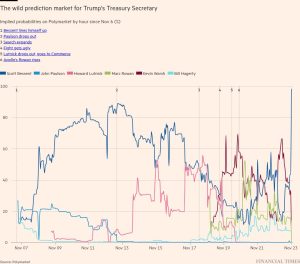Rachel Reeves signals UK business taxes will rise in Budget
Unlock the Editor’s Digest for free
Roula Khalaf, Editor of the FT, selects her favourite stories in this weekly newsletter.
UK chancellor Rachel Reeves on Monday gave her clearest signal yet that business taxes will rise in this month’s Budget, even as the government urged the world’s financial elite to unleash a “shock and awe” wave of investment in Britain.
Reeves repeatedly refused to rule out an increase in employers’ national insurance contributions, a move that would hit the bottom line of companies but could raise billions of pounds to help fill what she says is a £22bn hole in the public finances.
Speaking to journalists at an international investment summit in London, Reeves said business leaders understood that she had to take “difficult decisions” to balance the books to put the country on a stable footing and make the UK an attractive place to invest.
Earlier at the summit, Prime Minister Sir Keir Starmer called on global investors to unleash the “shock and awe of investment” in Britain, vowing to “rip up” bureaucracy and urging regulators to speed up decisions and back growth.
Starmer said the UK was once again open for business after the political “circus” that followed Brexit and declared: “You have to grow your business, I have to grow my country.”
The government claimed that a wave of private sector investment in projects across Britain worth £63bn had been announced to coincide with Monday’s summit, at London’s Guildhall, including £6.3bn on new data centres.
But the summit was held in the shadow of the government’s first Budget on October 30.
Reeves said she was “determined to get the balance right in the Budget” and that stable public finances were a precondition of growth. Jonathan Reynolds, business secretary, said the subject of higher taxes had not been raised with him at the summit.
Labour’s manifesto ruled out higher taxes on working people, including income tax, value added tax and national insurance. Reeves confirmed on Monday that this pledge only applied to employee NI contributions, not those made by employers.
“Our manifesto was very clear — it says “working people”, she said. “There’s a £22bn black hole above anything we knew about before the election,” she said, warning that this fiscal deficit would recur every year and needed filling.
Reeves could rake in billions of pounds by making employer pension contributions subject to NI, depending on the level at which the levy was set. The Resolution Foundation think-tank has suggested the tax change could raise up to £9bn a year.
“Unless you put Britain on a stable economic financial path, we’re not going to be able to get that investment in,” Reeves said. “That means there will be some difficult decisions, including on taxation. Businesses get that.”
The chancellor confirmed Labour’s manifesto pledge not to raise corporation tax above 25 per cent for the rest of this parliament but she is eyeing an increase in capital gains tax, according to government insiders.
However, Starmer told Bloomberg TV that speculation about an increase in the rate of CGT to as high as 39 per cent — the highest rate at present is 28 per cent — was “getting to an area which is wide of the mark”.
The prime minister told the summit he would tell regulators the “key test of regulation is of course growth” and that ministers would back cutting-edge sectors through a new industrial strategy.
He depicted the summit as an important moment in reviving the country’s global standing. “We are determined to improve it and repair Britain’s brand as an open, outward-looking, confident trading nation,” he said.
Starmer said this had been called into question after the “circus” that followed the 2016 Brexit vote, saying that the previous Conservative government’s tone had suggested it was anti-business and hostile to the EU.
He warned that, without an improving economy, there would be no return to the “great moderation” that preceded the 2008 global financial crash. “It’s not just that stability leads to growth — it’s also that growth leads to stability,” he said.
A lack of stability would lead to the “misting up of the shop window” of Britain as an inward investment location, Starmer added.
#Rachel #Reeves #signals #business #taxes #rise #Budget





